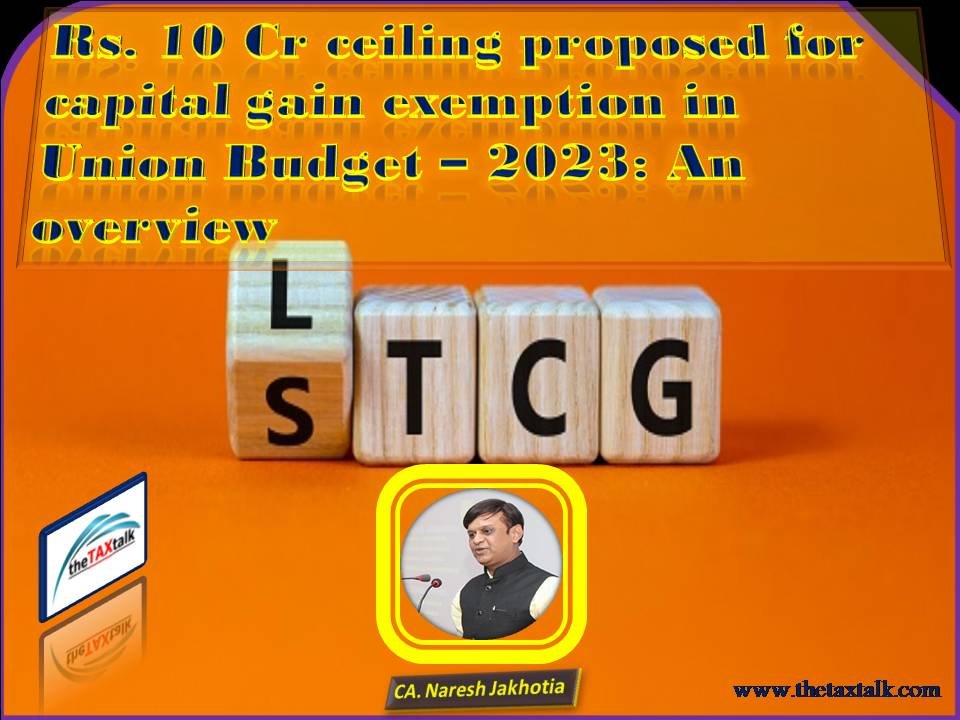![]()
Rs. 10 Cr ceiling proposed for capital gain exemption in Union Budget – 2023: An overview
“I propose to cap deduction from capital gains on investment in residential homes under Sections 54 and 54F to Rs 10 crore to target tax exemptions and concessions better.”
– Finance Minister Nirmala Sitharaman during her 2023 Budget Speech.
Income Tax Act provides exemption from Long Term Capital Gain (LTCG) tax if the amount is utilized by Individual/HUF for purchase or construction of house property within a prescribed time frame. There is currently no cap on the amount of exemption so long as the amount is utilized for purchase of another residential property. Any amount invested, be it Rs. 50 Cr or 500 Cr, is eligible for capital gain exemption. There are numerous cases, mostly in Tier 1 cities, wherein the capital gain of billions has been claimed as exempt by the taxpayers. The Union Budget-2023 has proposed to place a cap of Rs. 10 Cr on the amount of investment in the new house property for capital gain exemption. Let us know about it:
Capital Gain Exemption U/s 54:
Section 54 offers capital gain exemption if the capital gain arises from transfer of any long term capital assets which is a residential house property. For capital gain exemption, taxpayers have to invest the amount of LTCG for purchase /construction of another residential house property. For section 54, the amount of LTCG alone is relevant. If the amount invested in the new house property is more than the LTCG, the entire amount is eligible for exemption and no tax is payable as such. However, if the amount invested is less than the LTCG then only the amount invested would be eligible for exemption and balance would be taxable.
For example, Mr. Ram has sold his old bungalow for Rs. 25 Cr and has earned the LTCG of Rs. 11 Cr. He has invested say Rs. 20 Cr for purchase of the new house property. Since, his investment in the new house property is more than LTCG, nothing would be taxable in his hands.
Now, let us see the impact of the proposed amendment in this transaction wherein the cap of Rs. 10 Cr would be there. In above example, though Mr. Ram would be investing Rs. 15 Cr in the new house property, only Rs. 10 Cr would be considered for capital gain exemption. In short, only Rs. 10 Cr would be eligible for capital gain exemption U/s 54 and Rs. 1 Cr would be taxable in the hands of Mr. Ram.
Capital Gain Exemption U/s 54F:
Section 54F offers capital gain exemption if the capital gain arises from transfer of any long term capital assets other than residential house property. For capital gain exemption U/s 54F, taxpayers have to invest the amount of Net Sale Consideration for purchase /construction of another residential house property. It’s the amount of Sale Consideration which is relevant & not LTCG for exemption U/s 54F. If the amount invested in the new house property is not less than the Net Sale consideration, the entire amount is eligible for exemption and no tax is payable. However, if the amount invested is less than the net sale consideration then only a proportionate amount would be eligible for exemption. For example, Mr. Ram has sold his vacant plot (or say gold) for Rs. 25 Cr and has earned the LTCG of Rs. 11 Cr. He has invested say Rs. 20 Cr (i.e., 80% of the sale consideration) for purchase of the new house property. Since, his investment in the new house property is less than the amount of net sale consideration of Rs. 25 Cr, he is eligible for proportionate exemption of Rs. 8.80 Cr only (i.e., Rs. 11 * 20/25 Cr or 80% of capital gain of Rs. 11 Cr).
Now, let us see the impact of the proposed amendment on this transaction wherein the cap of Rs. 10 Cr would be there. In above example, though Mr. Ram would be investing Rs. 15 Cr in the new house property, only Rs. 10 Cr would be considered for capital gain exemption. In short, capital gain exemption would be required to be computed by considering the cost of the new house property at Rs. 10 Cr only. The capital gain exemption U/s 54F as a result of the proposed amendment would be Rs. Rs. 4.40 Cr only (i.e., Rs. 11 * 10/25 Cr).
Scope of proposed Amendment:
It is also proposed that if the amount deposited in the Capital Gains Account Scheme (CGAS) before furnishing the income tax return exceeds Rs. 10 crores then the amount to the extent of Rs. 10 crores will only be considered. These amendments will also take effect from April 1, 2024 and shall accordingly, apply in relation to the AY 2024-25 and subsequent assessment years. All the transactions done before 31.03.2023 will not be governed by the proposed amendment.
Conclusion:
The middle class taxpayers may not be much affected by the proposed amendment as the limit of Rs. 10 Cr is reasonable enough to take care of them. However, the proposed amendment is sure to hit High Net Worth Individuals (HNI). Union Budget 2023 is a mixed bag for HNI wherein on the one hand, the highest surcharge rate has been reduced from 37% to 25% & on the other side, a cap of Rs. 10 Cr has been placed for claiming capital gain exemption. The proposed amendment is surely going to affect the HNI selling their ultra-luxury apartments or lands.
[Readers may forward their feedback & queries at nareshjakhotia@gmail.com. Other articles & response to queries are available at www.theTAXtalk.com]
—
Regards,
CA Naresh Jakhotia
Partner – M/s. SSRPN & Co.
10, Laxmi Vyankatesh Apartment
Telephone Exchange Square
Central Avenue Road
Nagpur-440008.
Web : www.ssrpn.com
facebook: https://www.facebook.com/nareshjakhotia
linkedin : https://www.linkedin.com/in/ca-naresh-jakhotia-b2069b16/
http://nareshjakhotia.blogspot.in/
Phone Nos: (0712)2735479, 6549611
Cell No. : 094228-60300


